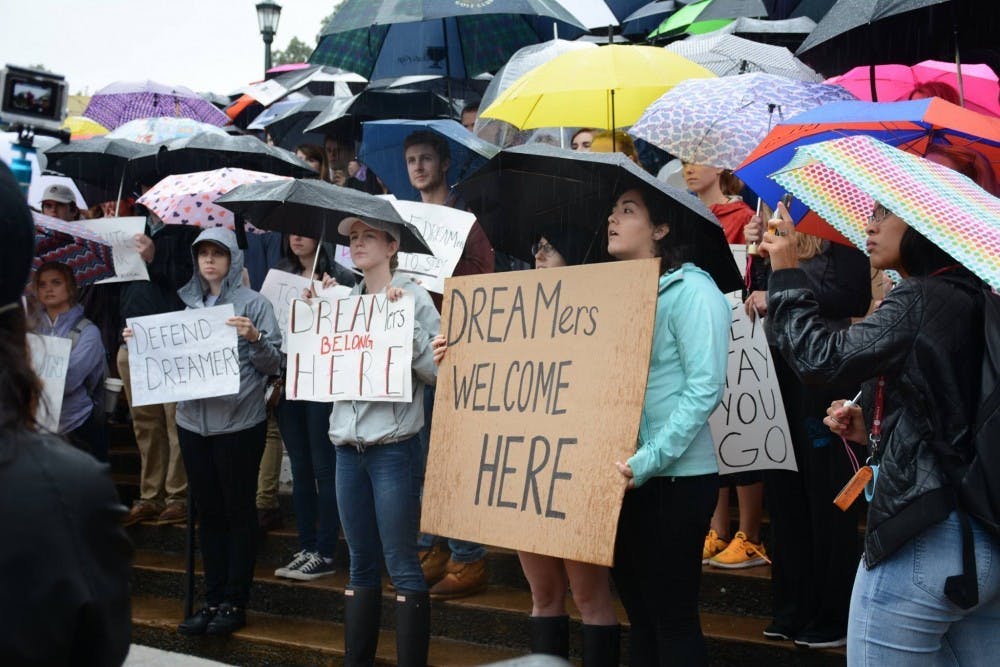In an op-ed for The Cavalier Daily concerning the Deferred Action For Childhood Arrivals program, second-year College student Tanner Hirschfeld made several assertions which our organization, “DREAMers on Grounds,” would like to respectfully challenge. Hirschfeld argues that DACA was an “unconstitutional executive order” which was tantamount to President Barack Obama writing law unilaterally, and that viewing the decision to repeal it as anything other than a constitutional issue is dangerous. He agrees the policy goals underlying DACA are favorable, but justifies his opposition to the program by accusing undocumented immigrants in general of not respecting the law — in contrast to his own ancestors — implicitly placing Dreamers who came as children in a more favorable light.
We believe Hirschfeld is incorrect. The decision to repeal DACA was a political decision. Moreover, invoking the Constitution in this debate along the line Hirschfeld does actually weakens the moral legitimacy of the document. Finally, splitting between “innocent” and “guilty” undocumented immigrants depends on a misunderstanding of U.S. immigration policy and its history.
There are strong constitutional arguments in favor of immigration policies like DACA, which were also implemented via executive action by other U.S. Presidents like Ronald Reagan and George H.W. Bush. The core premise of the DACA program is a well-settled legal principle called prosecutorial discretion. In essence, because Congress only appropriates funding to deport a small fraction of the undocumented population, the Executive must necessarily pick and choose who is placed in deportation proceedings and who is not. These are the types of decisions every law enforcement agency in America makes. Prior to DACA, the U.S. government was inconsistent towards Dreamers, deporting some but frequently letting others go.
DACA clarified discretion nationwide by deprioritizing Dreamers for deportation (while prioritizing other groups). There is nothing unconstitutional about this, and in a challenge to a DACA-like program called DAPA, the State of Texas even conceded as much, noting “the Executive has been free all along to issue ‘low-priority’ identification cards to aliens.” This process, called deferred action, then allowed Dreamers to apply for work permits pursuant to a 1986 law. No court has ever ruled DACA as unconstitutional.
DACA was rescinded on Sept. 5 because several states were threatening to challenge it in court if it was not repealed by that date. Many people felt it was incumbent upon the government to defend DACA against a lawsuit, and make a case for it in court. Instead, the entire program was rescinded. This was, as Obama pointed out in a Facebook post, a “political decision” which “[wasn’t] required legally.” For all the arguments about its constitutionality, DACA never even got a day in court. Using the U.S. Constitution to deflect legitimate objections to a policy decision not to defend DACA simply politicizes the Constitution.
We thank Hirschfeld for his support of the policy underlying DACA, but we also feel compelled to question his reasoning. Hirschfeld asserts that in contrast to his ancestors, who came to the U.S. legally in the late-1800s, undocumented immigrants who are not Dreamers should be treated less leniently for allegedly disrespecting the rule of law. However, this paints an incomplete picture.
A cursory glance at the history of immigration laws shows that late-19th century policy was substantially more liberal, and could arguably be characterized as an open border with European countries, a reality which only began changing around the 1920s. Unlike today, there were no numerical limitations on immigration and no familial or employment ties required. There weren’t even any visas — you simply showed up at a U.S. port of entry. Hardly anyone was denied, with Ellis Island’s denial rate across millions of immigrants estimated at under two percent. Congress even passed an amnesty in 1929 when the population of undocumented Europeans increased throughout the 1920s.
By contrast and contrary to popular belief, today most undocumented immigrants have no ability to “do it the right way.” As a general matter, modern laws require familial ties to U.S. citizens or advanced skill sets, and if you don’t have them you’re out of luck. But that doesn’t relieve the deep sting of poverty undocumented families have felt for generations, or the desperate hopes they have that in America their children might live a life of dignity.
It is fundamentally wrong, both logically and morally, to argue that because one group was able to meet very lax standards and another group was unable to meet very tight standards, the two are directly comparable. Contemporary undocumented immigrants got a bad hand in life, and their inability to comply with the law is not an irredeemable mark against their character — the strength of which presents itself daily as they work long hours to provide for their families, growing the food and making the beds we enjoy at the University.
To ignore all this, and instead dwell on only one dimension of their existence, is to ignore the complexity, humanity and beauty of America’s longstanding undocumented communities.





